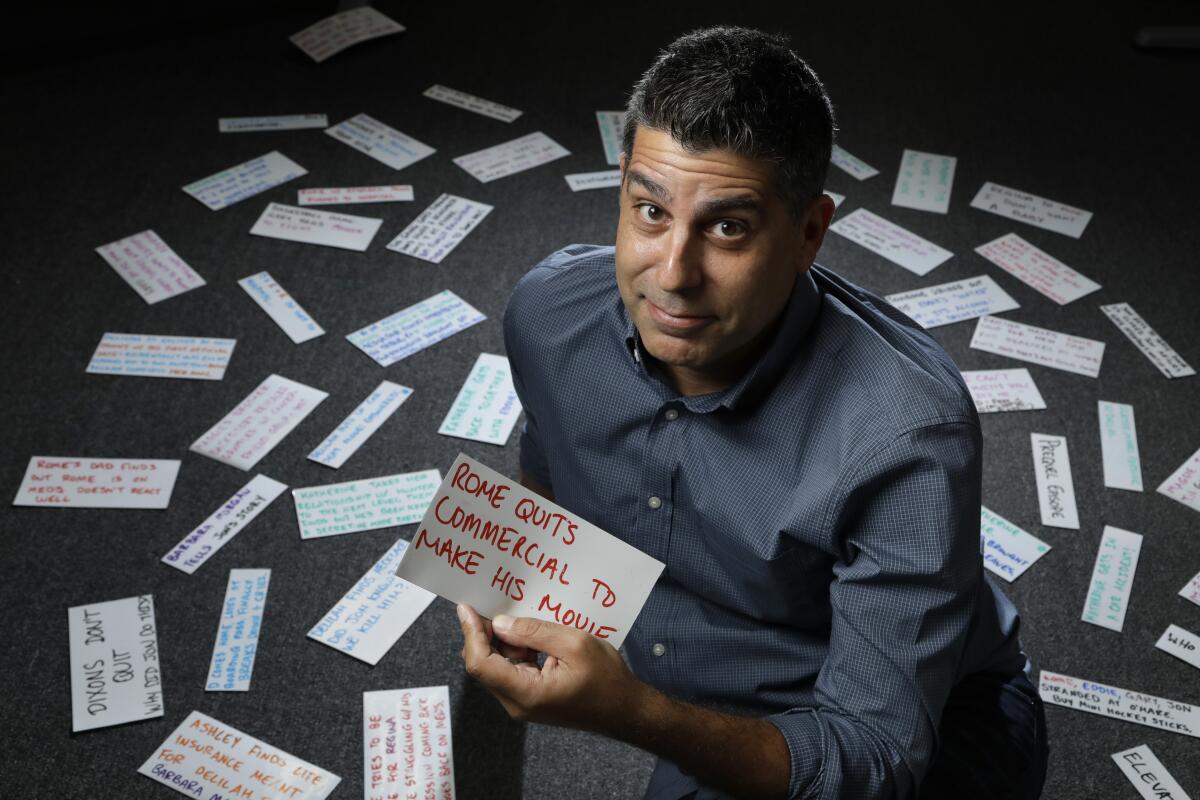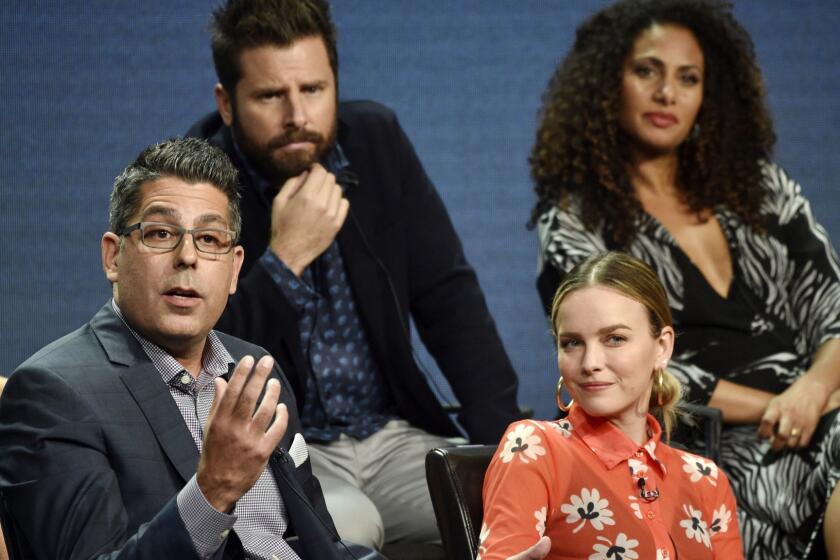For the showrunner of ‘A Million Little Things,’ ‘politically conscious’ trumps ‘politically correct’

- Share via
When DJ Nash set out to write the ABC drama “A Million Little Things,” which follows a group of friends coping with the death by suicide of one of their own, his hope was that it would generate discussion about mental health.
“You don’t want to be a PSA — you’re not telling the stories for that reason, but to realize, ‘Oh, we could make a change, we could bring attention to these issues,’ ” Nash said. “There’s two groups you want to talk to: the survivors, and the people who you want to prevent from doing this. And how do you reach both of them?”
ABC’s new Wednesday-night shows “A Million Little Things” and “Single Parents” — one a heavy-ish drama, the other a light half-hour comedy — are centered on the idea of friendship saving the day but built on old themes that traditional networks hope will save their bacon.
The first season examines the effect on his friends and family after Jon (Ron Livingston), a successful businessman who seems to have it all, takes his own life. All are battling existing personal issues: There’s Rome (Romany Malco), whose own suicide attempt is prevented by the call informing him of Jon’s death, and his wife, Regina (Christina Moses), who experienced sexual abuse as a child; Gary (James Roday), who worries about a recurrence of male breast cancer; and Eddie (David Giuntoli), who struggles with sobriety and has been cheating on his wife, Katherine (Grace Park), with Jon’s wife, Delilah (Stephanie Szostak).
For all the tragedy built into the series’ premise, Nash started out as a stand-up comedian in New York and spent his early years as a TV writer working in comedies. His first staff writing job was on NBC’s Whoopi Goldberg sitcom,”Whoopi,” in 2003. He’d go on to work on shows such as “‘Til Death,” “Traffic Light” and “Bent,” before creating the NBC sitcom “Growing Up Fisher,” a tribute to Nash’s blind father, which starred J.K. Simmons and aired in 2014; and NBC’s “Truth Be Told,” which aired in 2015. Both series lasted one season.
“A Million Little Things” returns for its second season Sept. 26, sandwiched between “Grey’s Anatomy” and the final season of “How to Get Away with Murder.”
Inside his sparsely decorated office in Studio City a few days into moving in in early April, Nash talked about the show’s responsibility in its portrayal of mental health; moving the show’s characters forward in ways that may upset viewers; not becoming the next Ray Romano; and his rules to live by as a showrunner.
Upsetting the fans isn’t always a wrong move
Last season, the tweet I got the most was, “Please don’t have Maggie die.” And from the moment I first got that tweet from my mother and from everybody else, I knew the character [played by Allison Miller] wasn’t going to. But I knew before we got there, I was going to move you, hopefully entertain you, hopefully make you laugh and make you cry, make you identify. Will you love everything that happens to these characters this season? I promise you, you will not. But if you continue to watch, you will see how they push through it and you will see how they are different because of it. The one to look at is, what is Katherine going to do? Is she going to take this guy back or is she going to kick this guy to the curb? If those are the two choices, then I’m going to have half of the audience angry regardless of which way I go.
With regard to Regina [and having a baby], I think on television we do not allow a woman to not have a baby unless there is a medical reason. And I don’t think that’s right. I love the idea that Regina doesn’t want to have a baby and that’s where she stands. That’s what it is. It’s not because of this or because of that. Every single person has the right to choose whether or not they want to be a parent. Now, like I did with my wife, the story is from a very personal place. We both got married saying, “No kids.” And we both changed our mind for different reasons. It could be that Regina changes her mind. It could be that she doesn’t. The question is why and how, and what’s that journey like? I know for sure it’ll piss people off, but people will lean in and hopefully they’ll identify and hopefully they’ll feel that whatever story we’re telling is authentic.
I’m not really thinking, “Oh, what do the fans want?” I’m thinking, “What would a person really do?” And so the three or four moves that happen in our first nine episodes that I know will upset fans, it’ll upset them because they go, “Yeah, I know, but it hurts.”
Grief doesn’t cease — but it does change
As a show with a premise that revolves around a group of friends grappling with the suicide of one of their own, the new ABC drama “A Million Little Things” heads into the fall TV season in a delicate position.
I was reading a book over the summer written by Dr. Jennifer Ashton, who is the medical consultant on “Good Morning America,” and she actually is going to be in Episode 6 of our show, playing herself. She wrote this book called “Life After Suicide: Finding Courage, Comfort & Community After Unthinkable Loss.” In the book, she talked about how the second year in some ways is harder than the first year, because the first year everyone’s aware it’s your first Thanksgiving, it’s your first Father’s Day, it’s your first whatever. In the second year, that safety net that you have kind of goes away a little bit and people think, “Oh, you’re better now,” but you’re not. And there’s still another daddy-daughter dance.
It doesn’t require us having Jon in the episodes as much, because he is fading a little bit from their lives. And I think that’s also what they’re struggling with. There’s an episode we do early on where Delilah can’t remember this tradition — the song that she and Jon used to sing to the babies — and it kills her because she was like, “I shouldn’t forget these things. I don’t want to forget these things.”
There’s a difference between ‘politically conscious’ and ‘politically correct’
I think I’m very aware of fans who watch the show, specifically fans who are struggling with depression or suicidal thoughts, fans who were hoping to be or are in remission with cancer, fans who have chemical dependency. I never forget them at all. In fact, a lot of the stuff that I do with the consultants is to make sure we’re being true to their story. The barometer I use for all the stories we tell is, if a person who had been through it is sitting next to me in the editing bay, would they be OK with the story we’re telling? They don’t have to love it. They can be upset by it, but would they say, “No, you got that right”? That’s really how I think about it, but I can’t let it dictate what I’m writing, because as soon as I try to teach with this show, [it’s] going to feel like an after-school special. I don’t simply want to come in and be politically correct. I do want to be politically conscious, but I’m telling stories. I’m just trying to tell a story that I believe.
On not being the ‘next Ray Romano’ or ‘next Jerry Seinfeld’
I was just doing stand-up in New York for a while. I’m doing as many shows as possible and my classmates in New York are incredibly big. Like Bill Burr and Jim Gaffigan and Ed Helms did my open mike night. Every night, I was seeing these folks, and, then, I did the Montreal Comedy Festival and I won the new faces competition. So the CBS gang gave me this development deal to develop a sitcom based on my stand-up. I was going to be, like, the next Ray Romano. I paired with a showrunner, Jeff Strauss, and he said, “Do you want to write it with me?” It was in 2000, so I was 28. I came out [to L.A.], co-wrote it with Jeff, loved writing it. It was just everything you think writing’s going to be. It was funny. We were distracted by video games. We’d go eat two-hour lunches; we’d come back and write. And then we got to shoot the pilot. The pilot gets picked up. It was for CBS. Elliot Gould played my dad. Peter Jacobson from “House” played my brother. Liz Vassey played my wife and this guy Bert Kreischer [who] was another stand-up played my best friend. They were all great in it. But I was so bad. It was called “Life with David J.”
I mean, I am proud of the script and I’m proud of their performances in the pilot. Pam Fryman directed it. It’s like the only show Pam Fryman ever directed that didn’t get on the air. It was kind of crushing, because I didn’t enjoy acting in it and I think you could feel it. So I was a little heartbroken, because I thought, “Well, I came out here to be Jerry Seinfeld.”
Everyone just wants to be heard
I think it’s so important to make sure people are heard. My first showrunner ever was Larry Wilmore, and he said to me, “You don’t have to take every note. You just have to let them know you heard every note.” And I think whether that’s a fellow writer, whether that’s a network exec, whether that’s an actor on set, whether it’s a director — I think about what I want. I don’t need everyone to agree with me. I just need to know, “OK, you heard me.” So I think every day I try to get better and better at that. That’s one. And then I think another thing for me, just in terms of creatively, is to always make sure every character has a confidante. You just need someone. It can be Colin the dog, but you just need to put somebody in there that they can talk to.
More to Read
The complete guide to home viewing
Get Screen Gab for everything about the TV shows and streaming movies everyone’s talking about.
You may occasionally receive promotional content from the Los Angeles Times.








